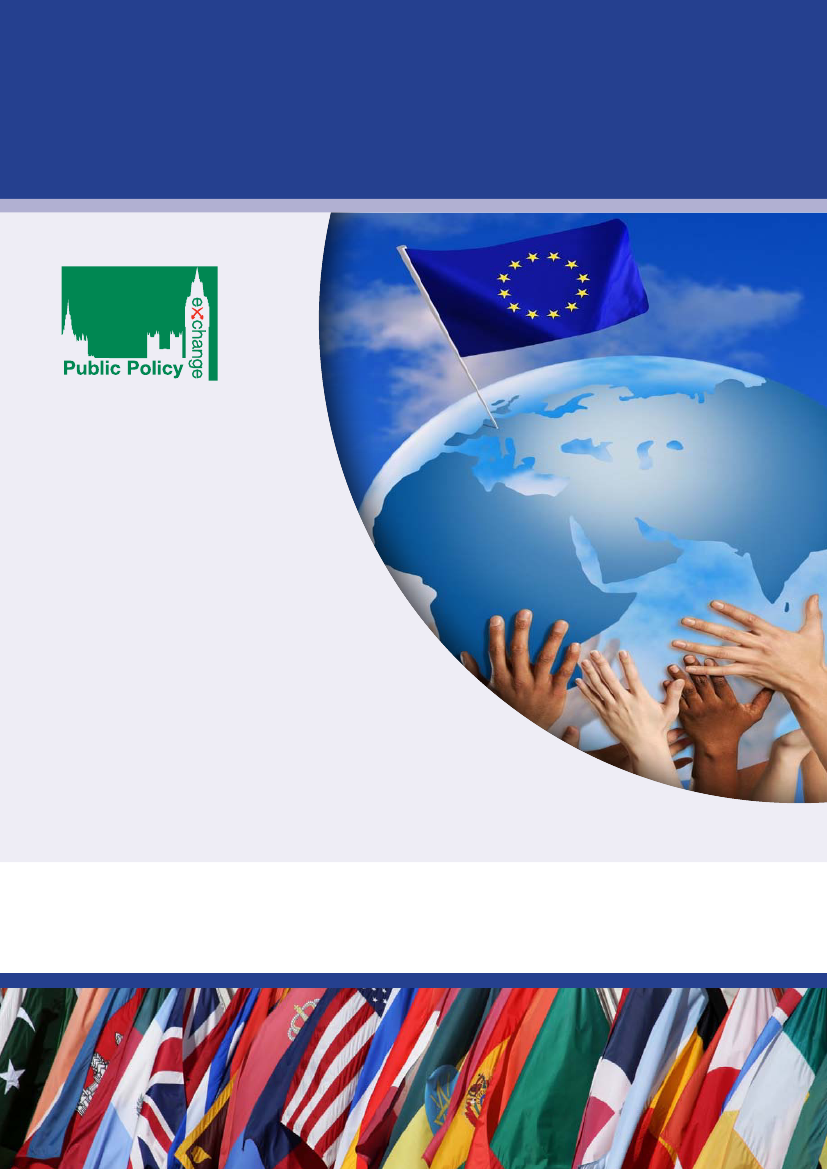Beskæftigelsesudvalget 2013-14
BEU Alm.del Bilag 208
Offentligt
Unlocking the Potential of Migrants in Europe:From Isolation to Multi-level Integration
Wednesday 2ndJuly 2014NH Hotel du Grand SablonBrussels
Unlocking the Potential of Migrants in Europe:From Isolation to Multi-level IntegrationOverviewOver the last few decades, international migration and globalisation have influencedthe public policy agenda across Europe and the wider world. In Europe alone there hasbeen a steady increase in the flow of resident immigrants. Eurostat figures suggest therewere 33.3m foreign citizens resident in the EU-27 in 2011, representing 6.6% of the totalpopulation, with the majority (20.5m) being citizens of non-EU countries.Immigration has an important role to play in addressing the EU’s future challenges, suchas demographic changes and labour shortage. Thus, the complexities of migration andintegration, and its impact on the EU economy and on the public policy of individualMember States, need to be approached in a more comprehensive and sustainable manner.The Commission’s 2005Common Agenda for Integrationhas helped to implement theCommon Basic Principles,agreed in 2004, which underline the importance of a holisticapproach to integration and assist EU States in formulating integration policies. EU policyhere has been further framed by the 2009Stockholm Programmeand theEurope 2020Strategy,where one of the headline targets is to raise the employment rate of 20-64 yearolds in the EU to 75%. One of the means by which to do this is by better integrating legalmigrants.In July 2011, the Commission proposed aEuropean Agenda for the Integration of Non-EUMigrants,focusing on action to increase economic, social, cultural and political participationby migrants and putting the emphasis on local action. This new agenda highlightschallenges that need to be solved if the EU is to benefit fully from the potential offered bymigration and the value of diversity.Migrants actively contribute to the economic, social and cultural development of Europeansocieties. Their successful integration into society in the host country is key to maximisingthe opportunities of legal migration and making the most of the contributions thatimmigration can make to EU development. Member States should empower communities,NGOs and relevant agencies at national and regional level to promote and foster discussionand cultural exchange.This timely international symposium provides an invaluable opportunity to discuss thecurrent challenges of migration and integration in Europe, and to reignite the debate aboutan EU-wide strategy to improve integration policies across Member States. The symposiumoffers a platform for the discussion of a better European regulatory framework, supportsthe exchange of ideas and encourages delegates to engage in thought-provoking topicaldebate whilst sharing best practices and lessons learnt.Migrants can make very powerful contributions to our societies. But thesecontributions can only be made if we are ready to recognize and use thepotential of migration…”- Cecilia Malmström, EU Commissioner, October 2013
Why Attend?9Assess the EU framework for legalmigration and explore solutions forbetter integration of migrants at EUlevel9Consider current challenges inintegrating third-country nationals inhost societies9Explore possibilities for increasingcooperation between governments,local authorities and NGOs topromote social cohesion anddiversity9Discuss data collection of migrationin the EU9Exchange best practices to developinnovative projects at the local level
Who Should Attend?• Equal Opportunities Officers• Equality, Diversity and Human RightsPractitioners• Immigration Advisers• Legal Advisers• Campaigning Organisations• Private Sectors Employers• Public Sector Employers• Central Government Departments andBodies• Regulatory Bodies• Citizen’s Advice• EU Officials• Housing Officials• Children and Youth Services• Social Services• Local, Regional and National Authorities• Local Authority Officers and Councillors• Governmental Departments andAgencies• School Authorities and Local EducationWelfare Authorities• Workers and Employers Confederations• Academics and Research Institutes• Migration Organisations• Legal Professionals• Multi-Agency Risk AssessmentConferences• Faith Groups• Equality and Human Rights Practitioners• NGOs
…Efforts should be focused on measures that provide the largest pay off,notably language and professional training, and on the most vulnerablegroups, such as young migrants. International migration flows are essentialfor the effective functioning of our economies…”- Angel Gurría, OECD Secretary-General, June 2013
Venue and AccommodationNH Hotel Grand Sablon,Rue Bodenbroek 2/4. B-1000 BrusselsBelgium
Enquiries: 0845 606 1535
www.publicpolicyexchange.co.uk@PublicPolicyEx
Unlocking the Potential of Migrants in Europe:From Isolation to Multi-level IntegrationProgramme09:1510:0010:10Registration and Morning RefreshmentsChair’s Welcome and Opening RemarksUnderstanding the EU Framework for Legal Migration• Shaping Common EU Legal Migration Policy - Successes and Failures of EU Selection and Admission Systems• Developing the European Modules for Migrant Integration• Circular and Labour Migration - Facts and Figures• Current Challenges and Recent Developments in European Immigration PolicyFirst Round of DiscussionsMorning Coffee BreakEconomic and Social Integration of Non-EU Nationals• Examining the Legal Framework for the Integration of Third-Country Nationals• Access to Education and Employment as Key Drivers of Integration • Ensuring and Protecting Basic Rights for Migrants in Host Societies - The Stockholm Programme and Action Plans• Combating Racism, Discrimination and Xenophobia• Exchange of Best Practices at EU and National LevelsSecond Round of DiscussionsNetworking LunchBest Practice in Integrating Migrants at National and Local Levels• EU Instruments and Funds to Support Integration - Progress and Development in Promoting Diversity• Encouraging Local and Community-Level Initiatives Through Increased Intercultural Dialogue• The Role of Cities in Integrating Migrants • Improving Partnerships Between Local Authorities and Civil Society• Lessons Learnt from the CLIP NetworkThird Round of DiscussionsAfternoon Coffee BreakMeasuring Migration and Integration in Europe• Comparing Integration Policies and Monitoring Systems Across Europe• Collecting Better Data on Migration - Introducing the MIPEX Project • Assessing Social Cohesion and Integration of Migrants • Examples of Best PracticesFourth Round of DiscussionsChair’s Summary and Closing CommentsNetworking ReceptionSymposium Close**Please note that the programme is subject to change without notice**
Event DetailsDate:Time:Venue:Wednesday 2ndJuly 201410:00am – 4:30pmNH Hotel du Grand Sablon,Brussels
10:4011:1011:30
Speakers Include9Anna Ludwinek,Living Conditions andQuality of Life (LCQL), EUROFOUND(confirmed)9Thomas Huddleston,ProgrammeDirector on Migration and Integration,Migration Policy Group (confirmed)9Ana Feder,Policy Advisor, Eurocities(confirmed)9Anna Platonova,Regional LabourMigration/Migration and DevelopmentSpecialist, Regional Office for theEEA, EU and NATO, InternationalOrganization for Migration (confirmed)
12:0012:3013:30
14:0014:3014:50
Forthcoming Events9Tackling Childhood Obesity in Europethrough Prevention and Partnership22nd April 20149Women’s Health and Well-being inEurope: Protecting Rights, PreventingInequalities13th May 20149Employment and Social Inclusionin Europe: Developing Skills andSupporting Disadvantaged Groups14th May 20149The 6th Annual InternationalSymposium on University Rankingsand Quality Assurance 201425th June 20149Strengthening Data ProtectionStandards in Europe: Towards aHarmonised European Digital Market1st July 2014
15:2015:5016:0016:30
Marketing and Exhibition OpportunitiesWe offer a range of opportunities to enable your organisation to raise its profile andcommunicate with key decision makers in the public sector.For further information please contact:Parvin Madaharon+44 (0) 20 3137 8630or email[email protected]
Enquiries: 0845 606 1535
www.publicpolicyexchange.co.uk@PublicPolicyEx



